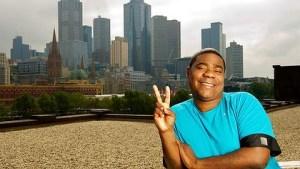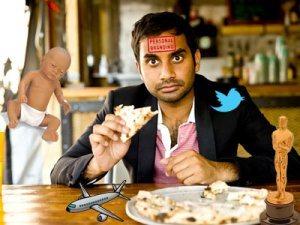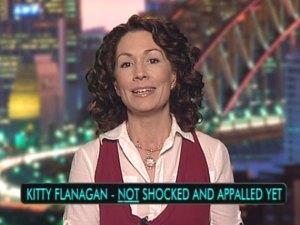“It’s safe to say, though, that you can get away with saying unsayable things if it’s done with some sense of culpability…There is a strong ethical dimension to the best comedy. Not only does it avoid reinforcing prejudices, it actively challenges them.” – Steve Coogan
Stand up comedy is a strange and compelling art form (as well as funny, you would hope), and it is something I love, fear, and admire. The 2013 Melbourne International Comedy Festival drew to a close last week, and I have immersed myself in as much stand up, variety, and improvisational comedy as anyone can (unless you’re a paid reviewer).

Tracy Morgan in Melbourne
I recently see saw Tracy Morgan’s live standup show at Melbourne’s Hamer Hall. If you haven’t heard, the negative reviews of Tracy’s show – as always – turned into a media storm. The backlash, where fifty people walked out of the show, was discussed by people who weren’t even at the show, and yet they still argued that the patrons complaining clearly have ‘no sense of humour’. Firstly, I had low expectations, and the show exceeded them. It wasn’t his humor that I didn’t connect with, it was the fact that he simply didn’t have a punchline. At all. For a whole hour. You could ask, why would you see a show that you have such low expectations for? Here are my reasons: Tracy is a notoriously inconsistent performer/ranter, I had previously youtubed his standup, and I knew he had a tendency to veer into sexist/misogynist/homophobic territory. However, he has worked with Tina Fey for 20 years, he has been a much-loved figure on Saturday Night Live and 30 Rock, and I wanted to see someone so high up on the comedic food chain live in action. The man is an entertainer, and I was excited – yet apprehensive – to see Tracy Morgan do his thing. Honestly, I also wanted to witness and be a part of a Tracy Morgan crazy-offensive rant/media storm. I didn’t think I was witnessing a pending media backlash during the performance – I just thought he was being offensive – but it turns out I did. I witnessed a stand up show that turned into a full blown media storm. Tracy Morgan disappointed me because he seemed tired, bored, lazy, and he was generally unfunny. He was up there for an hour and he actually repeated two of his jokes – which is not okay for someone who has been in the industry this long. It was a long, excruciating, and awkward hour. Tracy was offensive, yes. I have seen a lot of offensive – yet honest – comedy, and that is part of its beauty. As Australian comedian Dan Ilic says, comedy is a different way of viewing the world. Comedy is an art form where justice can come to light, flaws can be exposed and humans can relate to one another – that’s how powerful comedy is. Tracy Morgan’s stand up show was none of the above, and it was terrible.
Walking the thin line of cockiness/self-deprecation with Louis CK
Tracy also didn’t hit the mark at his Melbourne show simply because his content was offensive, and all he could talk about was how great he was, how big his (visible) dick was, and how far he has come. I wanted to ask, based on his stand up routine, “How did you even get this far?” and I wondered if the more famous a comedian gets, do they become less funny overtime? No, not usually – just some, who become lazy and resort to ugly stereotyping instead of witty jokes. The best comedians usually walk the fine line between confidant and self-deprecating – Tracy Morgan didn’t try to relate himself to his audience, he tried to stay above us.
Louis CK, on the other hand, is the “world’s funniest everyman”. His insightful humor blends offensiveness with comedy perfectly. He has four points of reference for his comedy: his weight, existentialism, masturbation, and his role as a single father. He has a whole comedy routine based on the use of the N-word and the C-word.(http://www.youtube.com/watch?v=zuLrBLxbLxw) How does Louis get away with it among such a broad audience? He uses humour, of course. One of the things I admire about Louis CK is his consistent blend of being an asshole and also self-deprecating at the same time. A comedian must walk the thin line between being an egotist and hating oneself, in a sense – because most comedy evokes the reaction from the audience: “It’s funny, because it’s true!” or “I can totally relate to that”. Louis CK, despite what he thinks of his weight, walks this line flawlessly.
One of my favorite Louis CK moments is his Cinnabon joke, where you think he’s going to lead into a tirade against the obese or lonely women, when he really flips it around on himself. It is one of the finest exampels of using self-deprecation as a convention of humor.

Aziz Ansari
Seeing your favorite sitcom actor do stand up
After the Tracy Morgan backlash, online commentators – who weren’t at the show – raised the argument: “Don’t just see someone’s standup because you expect it will be like their TV character”. First of all, Tracy Jordan (Tracy Morgan’s character on 30 Rock) doesn’t even do stand up comedy in the series, and Tracy Morgan even discusses this in his act. How could we possibly expect 30 Rock‘s Tracy Jordan when we’ve only seen him buy expensive things/teach Kenneth Parcell about sex? I think the better part of the audience expected raunchy comedy from a man who has been in the entertainment business for twenty or so years, and we were robbed of that experience. I love television shows, particularly sitcoms or dramedies. I am a fan of Community and Parks and Recreation, meaning I am a HUGE fan of Donald Glover and Aziz Ansari. Both Glover and Ansari do stand up comedy, and I watch their stand up clips and specials frequently.When I saw their stand up for the first time, I didn’t expect any Troy Barnes (Community) or Tom Haverford (Parks and Recreation), I expected two comedians who have worked in the comedy and entertainment industry, and thus I expected it to be funny.
My high expectations were met – Donald Glover is an extremely talented quadruple threat, and Aziz Ansari is just as hilarious – especially when he recounts his adventures with Kanye West, Jay Z, or 50 Cent learning what a grapefruit is.

Donald Glover
Donald Glover, like most comedians, covers some pretty controversial or “offensive” material. Like Tracy Morgan, Glover discusses sex in detail, or the use of the ‘N’ word. Unlike Tracy Morgan, (but like most – if not all – comedians) Donald Glover manages to overlay and justify the controversial topic with a joke. For instance:
Donald Glover is a natural story teller, which is perhaps enabled by his improv/actor/screenwriter background. Glover’s standup is quite personal, not like Louie CK, though. Whilst Louis CK tells of personal issues in a self-deprecating or existentialist fashion, Donald Glover tells stories of his childhood and growing up in a foster home. Aziz Ansari is similar, with more funny stories about show business and less jokes. Demetri Martin, (http://www.youtube.com/watch?v=mKnzPHtf9u4) on the other hand, is a jokester – 100% quick, sharp punchlines. Martin delivers his jokes in deadpan and doesn’t reveal much of himself. This is just as funny as Glover’s storytelling, or Louis CK’s self-reflections.
Gender roles in Comedy
I find that female comedians have to work a lot harder to get people to – firstly – like them (which is a sad, unfortunate truth – but it shouldn’t stop any women from doing stand up because we need to break this glass ceiling) and there are women who are breaking the standup comedy glass ceiling. Secondly, I find this effort translates into something that is hilarious, smart and witty, and thus I have never been disappointed by a female standup comedian. Australia’s Kitty Flanagan is a great example of this attention to detail, as well as UK’s Josie Long. Hannah Gadsby is a shining example of addressing controversial or serious issues in comedy, as she hilariously and tastefully deconstructs rape culture in her jokes. I would talk more about women’s roles and gender roles in comedy, but I’m saving that for another article that focusses on all the different types of comedy: stand up, improvisation, television/screenwriting, playwriting, sketch writing, performing, et cetera. However, in an effort to whet your appetite, here is a wonderful podcast from an interview with Josie Long about sexism in comedy. Enjoy.

Kitty Flanagan

